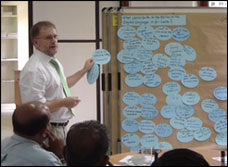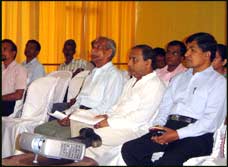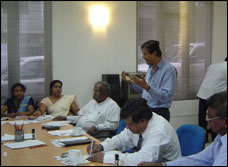|
The FES first established its office in Sri Lanka in 1965 on invitation by the late President Ranasinghe Premadasa.
It is not in many countries that the FES has worked continuously for such a long period of time. Early engagement with civil society was characterised by close cooperation with trade union organisations. This collaboration later expanded to include many areas of civil society activity, with a large number of government and non-government stakeholders becoming participants in local initiatives.
A significant milestone was achieved in 1974 when the FES set up the Sri Lanka Foundation Institute (SLFI) as a joint venture with the Sri Lanka Foundation (SLF). The SLFI project aimed to:
|
| |
 |
Promote understanding and belief in the democratic way of life and protect human rights; |
| |
 |
Promote in a democratic spirit, international understanding and cooperation, the universal respect for the observance of human rights and fundamental freedom for all, irrespective of race, sex, language or religion;
|
| |
 |
Encourage and promote education and the acquisition and diffusion of knowledge among the masses in all branches of knowledge and social progress. | |
 |
The SLFI has developed into a recognised venue for pluralistic, political discussions and a centre to meet the growing training and engagement needs of civil society and government stakeholders.
By setting up the Sri Lanka Television Training Institute (SLTTI) in 1984, the FES made a significant contribution to the country’s electronic media training field. The institute aspired to impart high standards of professional knowledge, skills and experience to Sri Lankan television media personnel. |
| Both institutions – the SLFI and the SLTTI – were subsequently handed over to the partner organisation, SLF, as provided for in the agreement of cooperation between the FES and the SLF. | |
| Over the years, the FES has worked closely with local civil society organisations and government institutions in the sphere of social change. Its experience with worker organisations is unique. During this course of these collaborations, it has produced a vast collection of important publications – jointly and individually – on a wide range of disciplines such as democracy, economy, labour, gender, conflict resolution, media, South Asian cooperation, etc. The FES has also supported research and study projects on areas of socio-economic interest. |
| The FES in Sri Lanka continuously engages in a process of joint collaboration with its local partners on areas of mutual interest in order to achieve certain progressive objectives. It contributes extensively towards the shaping of activities that it envisages to undertake with partners. This is to ensure that shared goals are attained with outcomes that are precise and measurable. In all its local endeavours, the FES seeks to create a constructive and scientific collaboration process that would bear positive and productive outcomes. |
| | |
|
|
|
| | |
















